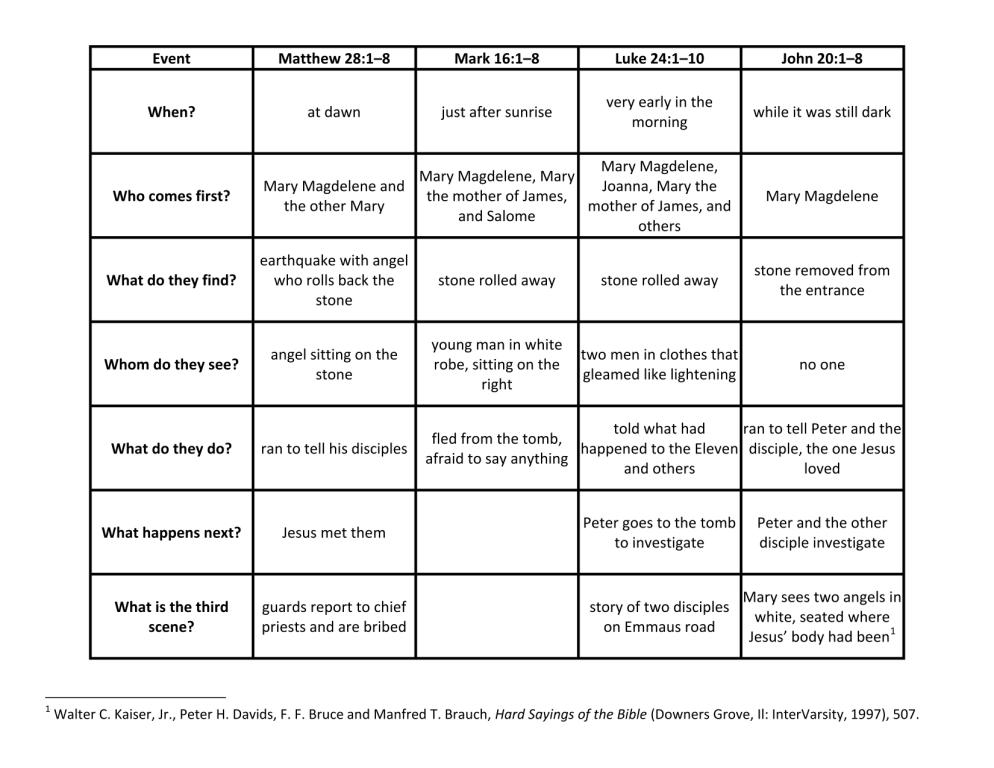Resurrection Accounts
Today we're going to be dealing with an issue that takes a bit of work and thinking, so bear with me. I'll be quoting extensively today from Hard Sayings of the Bible, which has a very helpful entry about the resurrection accounts. So what's the big deal about today's passage? It's definitely a pretty short reading for us today, but this entry will probably be pretty long. The issue is this: now that we're in Luke, you've probably noticed some differences between the resurrection accounts in the different Gospels. Here's a helpful chart comparing them (click to enlarge):
Also,
"...these stories are exactly what one would expect to discover after a significant event like the resurrection. The chancellor of this author’s university died at the end of an address to the student body. Within an hour of the event a sociology professor had his thirty students each write down their own account of what had happened. Each was instructed to write as honest and detailed account as they could, given the limited time of the class period. When the accounts were later compared, there were numerous differences in detail, although all agreed that the chancellor had died at the end of his address. Presumably each Gospel writer had a series of stories about the resurrection to sort through. For example, we know that Matthew knows and values Mark’s account, but in the resurrection story he obviously has some independent information as well. The Evangelists selected and combined data to get the accounts that they give us. But even the beloved disciple in John is not an eyewitness of most of the events, so we are not surprised to find a lot of differences in their reporting what happened." [2] (emphasis mine)
This last quote sums it up well I think:
"Finally, when we try to put the stories together, we miss the point of the authors. The church accepted into its canon four separate Gospels, viewing each as inspired by God. It did not put into the canon a harmony of these Gospels (although such existed). The fact is that each writer is trying to bring out his unique perspective and theological insights by the details he includes or leaves out... Matthew wants to underline the miraculous and also explain a rumor that the body of Jesus was stolen. Luke stresses the fulfillment of the words of Jesus and yet the disbelief of the apostles. John, by focusing on a single character and her intimate discussion with Jesus, points out that in the resurrection and ascension of Jesus the promises of John 13–16 are fulfilled. Jesus cannot be held, for it is better for him to go to the one who is not only his Father but is now also our Father. It is when we look at the resurrection through such eyes, informed by the perspective of each Gospel writer, that we see not simply a miracle, nor even the fact of the resurrection, but the message the church has believed that God wanted to communicate in and through the resurrection of Jesus Christ." [3] (emphasis mine)
I think this last point is the most important to make. It is absolutely possible to create a "harmony" of the events that occurred, though it would be difficult to know if we have "harmonized" things correctly. I think that we can have credible belief that none of the Gospel writers are lying about events that occurred, and that is vital. We expect the Gospels sometimes to be like a history book (which aren't always accurate and have biases as well!) and tell us everything about a given event. What we miss when we expect that is something that I've mentioned many times in our study: each Gospel writer has a purpose for their work and filters the stories they choose to tell through it. That is EXACTLY what we are seeing here. The accounts are different because they come from different people that noticed different things. Just as we often notice differing things about a particular passage of scripture, so the writers feel that differing things are important to portray about certain events. These are not contradictions, but evidence of differing personalities and purposes. Rather than expect four completely identical historical accounts, we should rejoice that we have four accounts that show the power of Jesus and His resurrection in from different perspectives. What we have here are four changed lives that are trying to communicate that change to others in the best way possible.
Questions? Comments?
[2] Ibid, 508.
[3] Ibid.

 RSS Feed
RSS Feed
